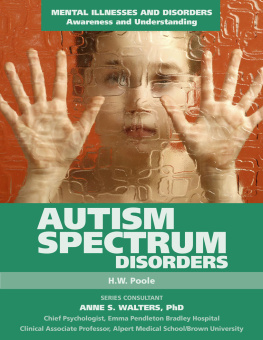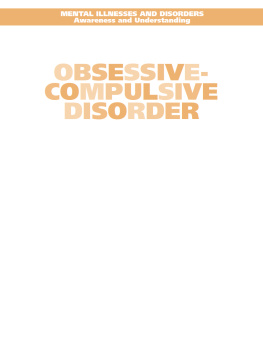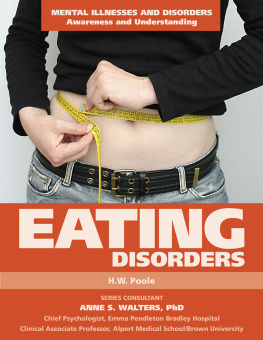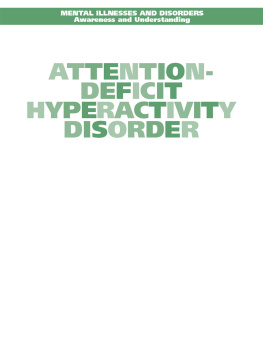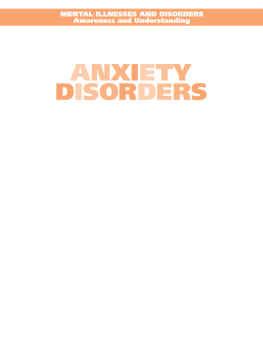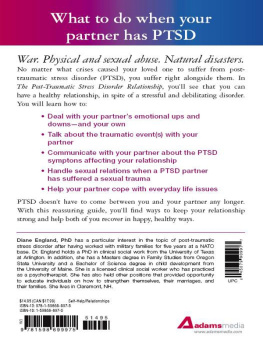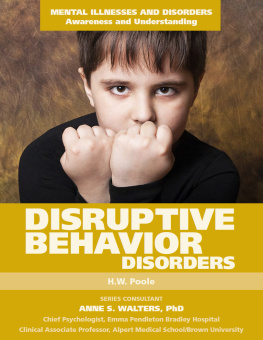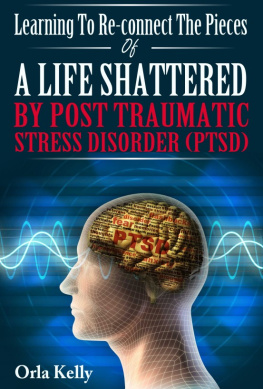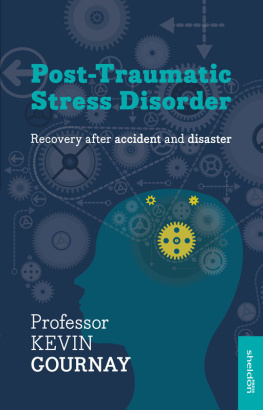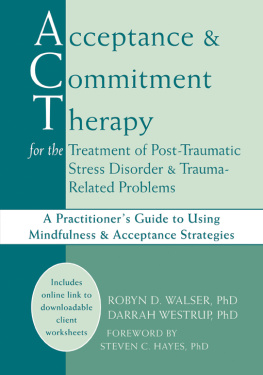 | Mason Crest
450 Parkway Drive, Suite D
Broomall, PA 19008
www.masoncrest.com |
2016 by Mason Crest, an imprint of National Highlights, Inc. All rights reserved.
No part of this publication may be reproduced or transmitted in any form or by any means, electronic or mechanical, including photocopying, recording, taping, or any information storage and retrieval system, without permission from the publisher.
MTM Publishing, Inc.
435 West 23rd Street, #8C
New York, NY 10011
www.mtmpublishing.com
President: Valerie Tomaselli
Vice President, Book Development: Hilary Poole
Designer: Annemarie Redmond
Copyeditor: Peter Jaskowiak
Editorial Assistant: Andrea St. Aubin
Series ISBN: 978-1-4222-3364-1
ISBN: 978-1-4222-3374-0
Ebook ISBN: 978-1-4222-8575-6
Library of Congress Cataloging-in-Publication Data
Poole, Hilary W., author.
Post-traumatic stress disorder / by H.W. Poole.
pages cm. (Mental illnesses and disorders: awareness and understanding)
Includes bibliographical references and index.
ISBN 978-1-4222-3374-0 (hardback) ISBN 978-1-4222-3364-1 (series) ISBN 978-1-4222-8575-6 (ebook)
1. Post-traumatic stress disorderJuvenile literature. I. Title.
RC552.P67P635 2016
616.8521dc23
2015009147
Printed and bound in the United States of America.
First printing
9 8 7 6 5 4 3 2 1
TABLE OF CONTENTS
Key Icons to Look for:
 | Words to Understand: These words with their easy-to-understand definitions will increase the readers understanding of the text, while building vocabulary skills. |
 | Sidebars: This boxed material within the main text allows readers to build knowledge, gain insights, explore possibilities, and broaden their perspectives by weaving together additional information to provide realistic and holistic perspectives. |
 | Research Projects: Readers are pointed toward areas of further inquiry connected to each chapter. Suggestions are provided for projects that encourage deeper research and analysis. |
 | Text-Dependent Questions: These questions send the reader back to the text for more careful attention to the evidence presented there. |
 | Series Glossary of Key Terms: This back-of-the-book glossary contains terminology used throughout the series. Words found here increase the readers ability to read and comprehend higher-level books and articles in this field. |

People who cope with mental illnesses and disorders deserve our empathy and respect.
(istockphoto/digitalskillet)
According to the National Institute of Mental Health, in 2012 there were an estimated 45 million people in the United States suffering from mental illness, or 19 percent of all US adults. A separate 2011 study found that among children, almost one in five suffer from some form of mental illness or disorder. The nature and level of impairment varies widely. For example, children and adults with anxiety disorders may struggle with a range of symptoms, from a constant state of worry about both real and imagined events to a complete inability to leave the house. Children or adults with schizophrenia might experience periods when the illness is well controlled by medication and therapies, but there may also be times when they must spend time in a hospital for their own safety and the safety of others. For every person with mental illness who makes the news, there are many more who do not, and these are the people that we must learn more about and help to feel accepted, and even welcomed, in this world of diversity.
It is not easy to have a mental illness in this country. Access to mental health services remains a significant issue. Many states and some private insurers have opted out of providing sufficient coverage for mental health treatment. This translates to limits on the amount of sessions or frequency of treatment, inadequate rates for providers, and other problems that make it difficult for people to get the care they need.
Meanwhile, stigma about mental illness remains widespread. There are still whispers about bad parenting, or the other side of the tracks. The whisperers imply that mental illness is something you bring upon yourself, or something that someone does to you. Obviously, mental illness can be exacerbated by an adverse event such as trauma or parental instability. But there is just as much truth to the biological bases of mental illness. No one is made schizophrenic by ineffective parenting, for example, or by engaging in wild behavior as an adolescent. Mental illness is a complex interplay of genes, biology, and the environment, much like many physical illnesses.
People with mental illness are brave soldiers, really. They fight their illness every day, in all of the settings of their lives. When people with an anxiety disorder graduate from college, you know that they worked very hard to get thereharder, perhaps, than those who did not struggle with a psychiatric issue. They got up every day with a pit in their stomach about facing the world, and they worried about their finals more than their classmates. When they had to give a presentation in class, they thought their world was going to end and that they would faint, or worse, in front of everyone. But they fought back, and they kept going. Every day. Thats bravery, and that is to be respected and congratulated.
These books were written to help young people get the facts about mental illness. Facts go a long way to dispel stigma. Knowing the facts gives students the opportunity to help others to know and understand. If your student lives with someone with mental illness, these books can help students know a bit more about what to expect. If they are concerned about someone, or even about themselves, these books are meant to provide some answers and a place to start.
The topics covered in this series are those that seem most relevant for middle schoolersdisorders that they are most likely to come into contact with or to be curious about. Schizophrenia is a rare illness, but it is an illness with many misconceptions and inaccurate portrayals in media. Anxiety and depressive disorders, on the other hand, are quite common. Most of our youth have likely had personal experience of anxiety or depression, or knowledge of someone who struggles with these symptoms.


